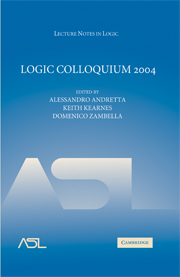Book contents
- Frontmatter
- Contents
- Introduction
- Speakers and Titles
- Abstract elementary classes: some answers, more questions
- On the density of Hausdorff ultrafilters
- Zero-groups and maximal tori
- Constructive set theory with operations
- Parametrized local zeta functions
- Colourings of hypergraphs, permutation groups and CSP's
- Tolerance intersection properties and subalgebras of squares
- Universes in type theory part I—Inaccessibles and Mahlo
- Hausdorff-dimension and weak truth-table reducibility
- Computation and the explanation of intelligent behaviours: ethologically motivated restart
- Constructible sheaves and definability
- An overview of modern universal algebra
- Lecture Notes in Logic
An overview of modern universal algebra
Published online by Cambridge University Press: 05 July 2014
- Frontmatter
- Contents
- Introduction
- Speakers and Titles
- Abstract elementary classes: some answers, more questions
- On the density of Hausdorff ultrafilters
- Zero-groups and maximal tori
- Constructive set theory with operations
- Parametrized local zeta functions
- Colourings of hypergraphs, permutation groups and CSP's
- Tolerance intersection properties and subalgebras of squares
- Universes in type theory part I—Inaccessibles and Mahlo
- Hausdorff-dimension and weak truth-table reducibility
- Computation and the explanation of intelligent behaviours: ethologically motivated restart
- Constructible sheaves and definability
- An overview of modern universal algebra
- Lecture Notes in Logic
Summary
Abstract. This article, aimed specifically at mathematical logicians, gives a gentle introduction to some of the central achievements and problems of universal algebra during the last 25 years.
I intend in this article to introduce nonspecialists to the fact that there are deep results in contemporary universal algebra. The first four sections give the context in which universal algebra has something to say, and describe some of the basic results upon which much of the work in the field is built. Section 5 covers the highlights of tame congruence theory, a sophisticated point of view from which to analyze locally finite algebras. Section 6 describes some of the field's “big” results and open problems concerning finite algebras, notably the undecidability of certain finite axiomatizability problems and related problems, and the so-called “RS problem,” currently the most important open problem in the field.
This article presents a personal view of current universal algebra, one which is limited both by my ignorance of large parts of the field as well as the likely interests of the intended audience and the need to keep the article focused. For example, I do not mention natural duality theory, one of the most vigorous subdisciplines of the field, nor algebraic logic or work that is motivated by and serves computer science. Therefore the views expressed in this article should not be taken to be a comprehensive statement of “what universal algebra is.”
The text is frequently imprecise and proofs, when present, are merely sketched. Credit is not always given where due. My aim is to give the reader an impression of the field. Resources for further reading are provided in the final section.
Information
- Type
- Chapter
- Information
- Logic Colloquium 2004 , pp. 197 - 220Publisher: Cambridge University PressPrint publication year: 2007
Accessibility standard: Unknown
Why this information is here
This section outlines the accessibility features of this content - including support for screen readers, full keyboard navigation and high-contrast display options. This may not be relevant for you.Accessibility Information
- 4
- Cited by
